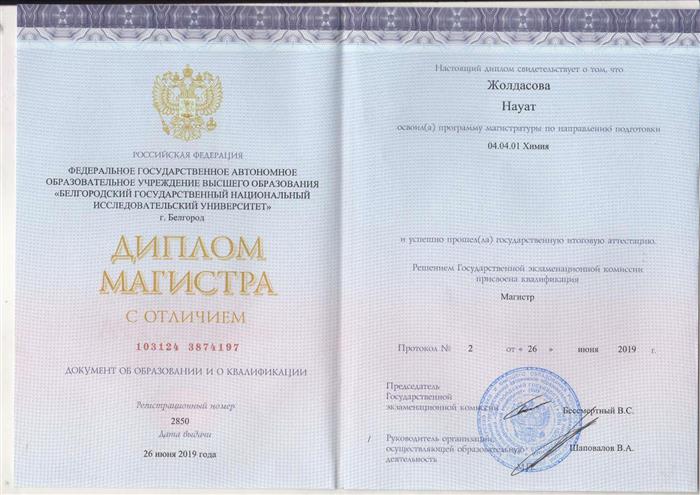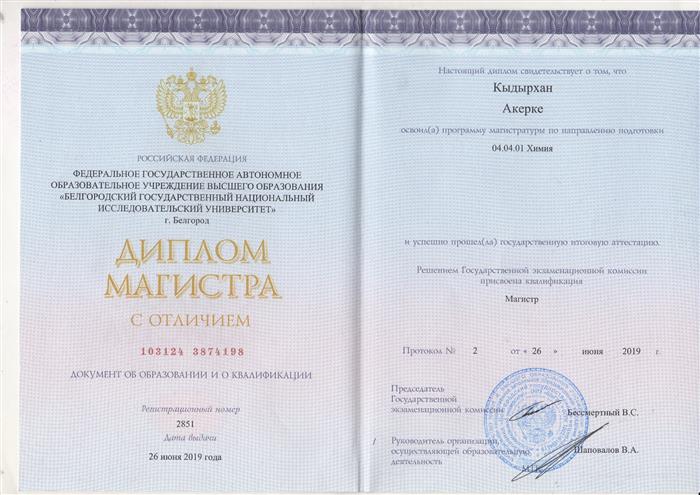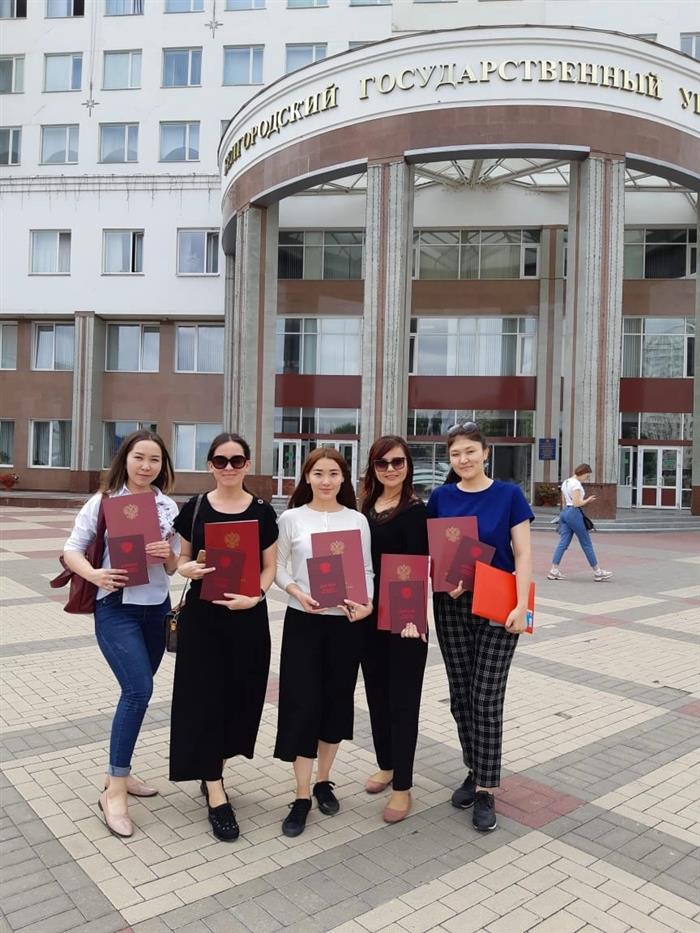Educational program
Master's degree
|
Name of the EP |
Coordinator |
Curriculum |
| Chemistry |
Ponomarenko O.I. | 7М01503 - Химия (2).pdf |
|
Educational program |
|
|
Field of education |
7M01 Scientific and pedagogical direction |
|
Direction of personnel training |
7M015 Teacher training in natural sciences |
|
Group of educational programs |
M013 Chemistry teacher training |
|
EP purpose |
Preparation of masters who have broad fundamental knowledge in the field of chemistry and pedagogy, who own modern educational technologies, and are also capable of managerial activities in the field of science and education. The program is aimed at developing a specialist capable of: - ensure the effectiveness of the educational process based on classical and innovative methods of teaching chemistry; - interpret and generalize modern knowledge about the latest theories and trends in the field of chemistry and pedagogy; - independently carry out scientific research in the field of chemistry and pedagogy; - interpret the results of scientific research in the field of chemistry and pedagogy with the subsequent generalization of the results; - formalize the results of research in the master's thesis and scientific publications. |
|
Language of education |
Kazakh/Russian/English |
|
Volume of the credits |
120 |
|
The awarded academic degree |
Master of Pedagogical Sciences on the educational program "7M01503-Chemistry" |
|
Educational outcome |
As a result of mastering the program, the master will be able to - Own subject knowledge in the field of theoretical positions, technologies, operations, practical methods and techniques for conducting scientific research. - Interpret and summarize chemical information, including in a foreign language. - To carry out the selection, structuring and implementation of the content of educational material in chemistry in accordance with the goals and objectives of chemical education, taking into account its most important functions, types and forms of lessons, extracurricular activities and extracurricular activities, as well as the characteristics of this educational institution, study groups, individual students. - Apply new educational technologies and teaching methods, with the introduction of innovations in the educational process. - Apply effective methods and means of managing the quality of educational services, identifying defects in the organization related to the quality of educational services. - Apply the basic principles of educational systems management. - To exercise control and correction of the pedagogical process (including self-control and self-correction). - Improve professional competence in the field of chemistry. - Present the results of educational and research activities in the form of scientific reports, abstracts, educational research and scientific projects. - Formulate the problems and tasks of scientific research in the field of chemistry and educational technologies, with the choice of methods and means for solving the tasks. - Carry out scientific experiments in the field of chemistry and adequately interpret the results. - Participate in teamwork, with analysis and evaluation of work situations to find ways to effectively interact with team members. |
|
For applicants |
https://welcome.kaznu.kz/en/education_programs/magistracy/speciality/1416 |
|
Academic activity |
The term for mastering the educational program is 2 years. The labor intensity of the educational program is 120 credits (ECTS). |
|
Scientific activity |
To implement the educational program, the faculty has laboratories: 47 educational and research laboratories. Including: - Laboratory of Radiation Ecology named after Maria Sklodowska-Curie; - Laboratory of binding materials; - Laboratory of phosphate fertilizers; - Laboratory of Electrochemical and Ecological Research - Extraction laboratory; - Thermal analysis laboratory . The faculty has research schools (analytical chemistry, colloidal chemistry, inorganic chemistry, organic chemistry, physical chemistry, chemical physics, catalysis, chemistry of macromolecular compounds); the widest range of scientific research in the field of chemistry within the framework of projects and programs of grant funding and economic contract projects. In teaching, the best modern educational methods, innovative technologies and various active forms and methods of teaching are used: creating projects, preparing public speaking, debating discussion of professionally oriented presentations, trainings, a combination of individual and team work. Classes in the disciplines included in the educational program are taught by experienced lecturers with extensive teaching experience. The teaching staff includes: doctor of sciences, candidates, PhD of doctorates. Teachers regularly take advanced training courses at the Republican and International levels. |
|
International activity |
In the framework of academic mobility, undergraduates have the opportunity to undergo internships and receive training in higher education institutions: - Research Institute of IMMT RAE (Institute of means and methods of teaching of the Russian Academy of Education); - Moscow State Pedagogical University; - Moscow State University named after M.V. Lomonosov; - Belgorod State University; - Russian State Pedagogical University named after A. Herzen; - University of Kiel named after K.Albrecht (Germany). |
|
Quality assurance (Accreditation, rating, work with employers) |
The educational program is accredited by ASIIN (accreditation period is 03/31/2017-09/30/2022). According to the results of the ranking of educational programs among universities of the Republic of Kazakhstan, it ranks: NAAR - 1st place; NCAA - 1st place. When compiling the educational program, the following were taken into account: - modern requirements of the labor market to the qualities of employees of the education system of the Republic of Kazakhstan; - the main trends in the development of chemical education in the modern world; - strategic programs for the development of the education system in the Republic of Kazakhstan, decisions of the Ministry of Education and Science of the Republic of Kazakhstan, international conferences and congresses in the field of education; - the basic principles of the Bologna process; - the content and structure of standard and working curricula of pedagogical specialties of foreign universities (the Russian Federation, the Federal Republic of Germany, Singapore, etc.). |
Double Degree Education
Within the framework of the master's program of the University of the Shanghai Organization under the program of double diploma education, master students of the specialty "Chemistry" Zholdassova N. and Kydyrkhan A. have been at the Belgorod State National Research University (Belgorod, Russia). As the undergraduates themselves note: "Training in a duble-degree program contributes to the expansion of knowledge, the exchange of experience, and the accomplishment of experimental skills."
 |
 |
|
Diploma of awarding a master's degree to Zholdassova N. of Belgorod State University, 2019 |
Diploma of awarding a master's degree to Kydyrkhan A. of Belgorod State University, 2019 |
Directions of professional activity.
After graduating from the master's program in the educational program "7M01503 - Chemistry", young specialists can carry out professional activities in the following areas :
- pedagogical;
- scientific - research;
- managerial;
- cultural and educational.
The main possible professions.
- university professor; college, lyceum;
- director, head teacher or methodologist in schools, colleges and other educational institutions;
- researcher;
- teacher;
- laboratory assistant;
- specialist.
For the future employment of program graduates, key employers are:
- universities
- colleges
- secondary schools
- institutions of vocational education, secondary general education, systems of additional education
- district and regional (city) departments of education
- republican bodies (committees) of education
- publishing houses and editorial offices of scientific and methodological journals
- scientific - research (universities, scientific research institutes of problems of education, academies, etc.) organizations;
- cultural and educational (in the houses of education, palaces of schoolchildren and students.) institutions.









